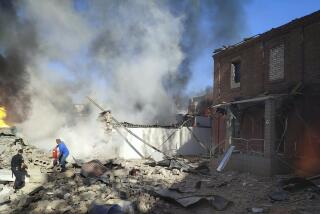Russian Agency Reveals Crisis in Nuclear Power Safety : Energy: Report cites 20,000 violations last year. Problems include radiation leaks, uranium thefts and growth of hazardous waste.
- Share via
MOSCOW — Nuclear power in Russia poses a growing danger to human safety because of radiation leaks, thefts of uranium, ignorance of security regulations and shortages of funds to bury hazardous waste, a government watchdog agency reported Tuesday.
In its first survey as an independent body with enhanced powers, the Federal Nuclear and Radiation Safety Oversight Committee counted 20,000 safety violations in 1993--nearly four for each of the 5,500 inspections it made.
As a result, the agency said it temporarily shut down 78 of the 14,500 enterprises involved in atomic power, reprimanded 232 officials and charged two others with crimes. It also gave pop quizzes on safety procedures to 5,000 atomic energy workers and flunked 437 of them.
“There are serious drawbacks in the way we approach the problem of physical safety of nuclear materials in this country,” Yuri G. Vishnevsky, chairman of the watchdog agency, told a news conference.
The agency’s report painted a worrisome picture of what, at least through last year, was one of Russia’s few growth industries. Nuclear power supplies 11% of the country’s electricity and as much as 80% of it in some heavily populated regions.
But none of the country’s 29 nuclear reactors has all the right equipment for preparing radioactive waste for burial, the report said, and their existing pre-burial storage facilities are expected to fill up within two to three years.
Russia needs $72 million this year to bury the waste or expand its storage facilities and carry out other urgent maintenance, Vishnevsky said. But with government agencies scrambling for a share of the 1994 budget, he is not optimistic.
A more immediate problem is the inter-company debts that paralyze much of Russia’s economy. The nuclear power industry is owed $210 million by its clients; unless the government helps it collect, Vishnevsky said, reactors at St. Petersburg, Kursk and Smolensk could run out of fuel within months and shut down.
Obscure and weak under Soviet rule, the oversight committee was empowered last year by President Boris N. Yeltsin to inspect all civilian and military handlers of nuclear materials and enforce safety regulations.
But Vishnevsky said the agency is hindered by the lack of a modern legal code to regulate the industry, parts of which are coming under private ownership, and by resistance from the Defense Ministry to outside inspection of its bases.
Under Yeltsin’s new regulations, the agency can order an enterprise shut down--a drastic measure that it uses sparingly. But under existing legislation, which dates to the pre-1991 Soviet days, the maximum fine it can levy is 100 rubles, about 6 cents at today’s exchange rate.
Without serious penalties, law enforcement officials say they cannot stop poorly paid workers from stealing uranium for sale abroad as reactor fuel or bomb-making material.
The Nuclear Power Ministry reported three such thefts last year. But the watchdog agency recorded 10 thefts in 1993 totaling about 350 kilograms of spent uranium fuel.
More to Read
Sign up for Essential California
The most important California stories and recommendations in your inbox every morning.
You may occasionally receive promotional content from the Los Angeles Times.













